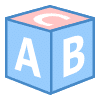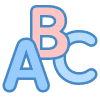English
The English language has a pre-eminent place in both education and society
With the right educational programme, English can help children speak and write fluently, allowing them to communicate their ideas and emotions to others. Through reading and listening, others can communicate with them

English
Key Stage 1
At each Key Stage, your child will learn different English-related topics when attending school. Here, we provide you with some details of what your child will learn as they progress through their academic years.
Literacy is made up of three aspects: Reading, Writing, Speaking and listening
Year 1
Reading
- Short words made up of a consonant-vowel-consonant, and progressing to longer words
- Sounds made by groups of vowels
- Letters which can make different sounds (eg, ‘g’ in get or gem)
- How to work out two and three syllable words
- To make sure that what they are reading makes sense to them
- How to interpret stories using characters and dialogue
- Your school will probably have a reading scheme which the children work through, and they will be expected to read at home – you’ll probably have a ‘reading record’ book to keep a note of this. At school they will read individually with their teacher, and also in small groups, which is known as ‘guided reading’.
Writing
- Composing simple sentences using capital letters and full stops
- Writing with ‘finger spaces’ between words
- Learning to spell simple words
- Attempting to spell new words using phonics
- Forming letters correctly with a comfortable pencil grip, ready for joined-up handwriting later
- Using a keyboard to write their name and simple sentences
- During year 1 children work on their versions of familiar stories and fairy tales, as well as writing about their own experiences and putting together pieces of non-fiction; for example, they may produce a fact box about their favourite animal. By the end of year 1 most children will be able to write a short, simple story with a recognisable beginning, middle and end.
Speaking
- Acting out and telling stories
- Reading aloud
- Joining in when a story is read aloud
- Taking part in class discussions (this helps to build vocabulary).
Year 2
Reading
- Reading around 150 high frequency words automatically
- Blending sounds to work out new words
- Reading longer and less familiar texts
- Reading whole books on their own
- Explaining stories and identifying characters
- Recognising prefixes and suffixes
- Most children are becoming more confident readers by year 2. They will probably still be working through the school reading scheme, and will be reading with the teacher and in small groups (guided reading).
Writing
- Writing clearly, using the correct capital and lower case letters
- Using the correct spacing between words
- Beginning to join some letters
- Using question marks and commas
- Becoming more confident with spelling, both familiar and new words
- Using the past tense with regular verbs
- Using time connectives.
Speaking and listening
- Reading aloud clearly and with expression
- Using a wide vocabulary
- Listening to other children and adults, and remembering the main ideas
- Following instructions.

English
Key Stage 2
Year 3
Topics the children may cover include:
- Myths and legends
- Adventure and mystery
- Plays and dialogue
- Poems to perform
- Shape poems
- Non-fiction: reports, instructions, information texts.
Reading
- Reading new words independently
- Reading longer and unfamiliar passages independently
- Understanding themes, plots and story ideas
- Making predictions
- Identifying the features of different types of texts, particularly in non-fiction
- Developing reading preferences and explaining why they like certain books
- Empathising with characters.
Most children will be reading around 300 of the most frequent words, and this increases rapidly throughout the year, as a result of their phonic skills. Not all children are confident readers by year 3 however, and it’s important that these children stay motivated. Wanting to read is an important part of being able to read, so reading aloud to your child is crucial, as it allows them to enjoy books beyond their own reading level.
- Beginning to use paragraphs
- Using verbs, nouns and adjectives
- Beginning to use speech marks and exclamation marks
- Writing events in sequence
- Using connecting words such as ‘if’, ‘so’ and ‘but’
- Practising handwriting, making sure size and spacing is consistent
- Using a keyboard to type and edit.
Speaking and listening
- Practising performance skills with stories and poems
- Beginning and sustaining conversations
- Contributing to group discussions and giving their opinions
- Discussing performances by other people
- Presenting information clearly and carefully.
Year 4
Topics your child may cover include:
- Myths and legends
- Adventure and mystery stories
- Poetry
- Stories with historical settings
- Stories in imaginary worlds
- Stories from other cultures
- Significant authors
- Classic novels
- Drama
- Newspapers and magazine articles
- Information texts
- Persuasive writing
- Biography and autobiography.
Reading
- Read new words independently
- Understand themes, plots and ideas
- Recognise the use of figurative language
- Use structure
- Compare different writing styles
- Find information in a piece of non-fiction.
Writing
- Paragraphs
- Punctuation
- Connectives
- Clauses with commas
- Adverbs
- Possessive apostrophes
- Direct and reported speech
- Active and passive voice.
Speaking and listening
- Performance skills
- Improvisation
- Speaking to an audience.
Year 5
Children will study one or more of the following topics:
- Stories by significant authors
- Fables, myths and legends
- Stories from other cultures
- Older literature
- Stories and film
- Drama
- Poetry and poetic styles
- Persuasive writing
- Recounts.
Reading
- Using context to understand new words
- Comparing different styles of writing
- Exploring the meaning of stories
- Examining how language can be used to create humour or drama
- Comparing fiction and non-fiction
- Concentrating on a particular children’s author and examining their style
- Empathising with characters
- Developing personal reading goals, based on their favourite books and authors.
Writing
- Spelling words with unstressed vowels
- Using direct and reported speech
- Using paragraphs and apostrophes correctly
- Using words with less familiar prefixes and suffixes
- Experimenting with styles of writing
- Creating written work for a variety of audiences
- Writing their own versions of existing stories, perhaps from an alternative point of view
- Researching and writing articles and reports.
By now, most children are writing confidently, with a good grasp of spelling and neat handwriting. The focus now is on extended writing, with time spent planning and editing their work. They will be working on stories, poetry and non-fiction, and the teacher will be expecting them to experiment with styles and language, and show a good understanding of grammar and punctuation. All their handwriting should be joined up, and they should be getting confident with a keyboard.
Speaking and listening
- Working in a group, taking the lead or supporting others
- Presenting their opinions using persuasive language
- Identifying differences in speech for formal and informal occasions
- Using role play
- Performing plays using scripts and improvisation
- Using performance poetry.
Year 6
Your child will be working on stories, poetry and non-fiction and concentrating on one or more of the following areas:
- Different genres
- Significant authors
- Short stories with flashbacks
- Biography and autobiography
- Journalism
- Persuasive writing
- Poetic imagery.
Reading
- Interpreting characters, themes and points of view
- Understanding that words can have different meanings in different contexts
- Understanding how authors use structure and language to create a tone
- Reading classic novels
- Interpreting non-fiction and identifying a point of view
- Comparing writers from different times or parts of the world.
Writing
- Developing more complex characters and settings
- Experimenting with time and structure
- Using paragraphs in longer stories
- Using direct and reported speech
- Understanding the difference between the active and passive voice
- Adapting writing styles to suit the audience
- Using the conditional
- Experimenting with non-fiction through journalism, biography and autobiography.
Speaking and listening
- Devising performances for particular audiences
- Analysing performances by others
- Taking part in group discussions looking at ideas of conflict and resolution
- Offering and accepting constructive criticism
- Explaining how a speech can alter, depending on the audience.

English
Key Stage 3
Years 7–9
Your child will work on a wide range of material, which may include:
- At least one play by Shakespeare
- English classic novels
- 20th century novels
- Contemporary novels
- Authors from different cultures
- Drama
- Poetry and ballads
- Journalism
- Advertisements and persuasive writing
- Travel writing
- Essays
- Diaries
- Play scripts
- Reviews
- Literature on film.
Reading
KS3 children are expected to be fluent, confident readers, so the emphasis now is on:
- Reading for meaning
- Understanding the author’s craft.
Writing
In their written work, the children will be producing fiction and non-fiction, and concentrating on:
- Planning and drafting
- Presenting ideas logically and clearly
- Precise and imaginative vocabulary
- Using correct punctuation in sentences and speech
- Structure and presentation
- How to edit, proofread and revise their work on screen and paper.
Language
- How spoken English varies according to region or setting
- How English has developed over time
- How English is used in different contexts.
Speaking and listening
- Listening to a talk or discussion and picking out the main ideas
- Thinking about ways of making their speech more interesting
- Contributing to group discussions
- Putting on performances, either independently or in groups, of improvised or scripted plays.

